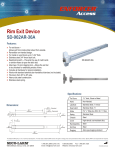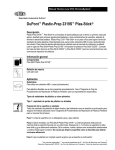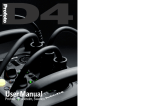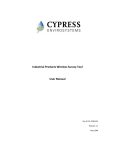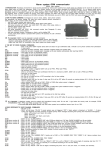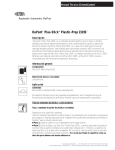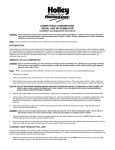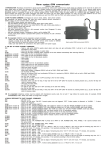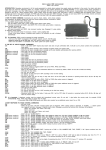Download Hager AE-4501SVRUS32D Installation Guide
Transcript
4500 Series Surface Vertical Rod Exit Device Installation Instructions Grade 1 I-ED00792 DEVICES COVERED IN THIS DOCUMENT: 4500S Surface Vertical Rod Device 4500SF Fire Exit Surface Vertical Rod Device 4500S Less Bottom Rod (LBR) Device 4500SF Fire Less Bottom Rod (LBR) Device APPLICATIONS Double Door Double Door with Rim Device TOOLS REQUIRED Metal Wood Wood and Metal Screws Sex Bolts For wood doors, drill 1/8” hole Drill 5/16” thru from device side. Drill 3/8” from other side (pull side). Machine Screws #7 1/4” - 20 REV 5 1/8” 26490169 #7 drill, 1/4” - 20 tap Check building and fire codes to see if your application requires the use of sleeve nuts and bolts. Page 1 of 13 4500 Series Surface Vertical Rod Exit Device Installation Instructions Grade 1 I-ED00792 EXIT DEVICE PARTS AND SUB-ASSEMBLIES TOP STRIKE (FIRE RATED) TOP STRIKE (PANIC RATED) MOUNTING BRACKET TOP LATCH ASSEMBLY END CAP TOP LATCH COVER ROD CONNECTOR END CAP BRACKET CHASSIS DEVICE BODY PUSH BAR HEX WRENCH DOGGING DEVICE (ONLY ON PANIC HARDWARE) BOTTOM ROD CHASSIS COVER ROD GUIDE SEX BOLTS BOTTOM LATCH COVER MOUNTING BRACKET BOTTOM LATCH ASSEMBLY BOTTOM STRIKE (PANIC RATED) BOTTOM STRIKE ANCHOR BOTTOM STRIKE (FIRE RATED) REV 5 26490169 Page 2 of 13 4500 Series Surface Vertical Rod Exit Device Installation Instructions Grade 1 I-ED00792 LBR DEVICE NOTES LBR devices require the following additional components: • Head Cover Hole Plug – P/N 26490167 • Auxiliary Fire Latch – P/N 26490166 (Required for Fire Doors) LBR DEVICE Important Notes: Read this first! • Fire rated devices must be ordered and installed in pairs of vertical rod devices or can be used in conjunction with an approved automatic or constant latching flush bolt. • The auxiliary fire latch will keep the doors in alignment during a fire when the bolt extends from the auxiliary fire latch into the strike hole in the opposite door. For the auxiliary fire latch bolt to extend into the strike hole, the black cap visible on the face of the auxiliary fire latch and the strike hole plug must melt. Therefore, do not cover the door gap directly in front of the auxiliary fire latch with a door edge guard or any other similar type of device. • A double door application consists of two LBR devices and one auxiliary fire latch. The auxiliary fire latch should be installed in the inactive door to maintain fire listing. • The auxiliary fire latch is only for use with the Hager 4500 Series LBR devices. The 4500 Series LBR device comes with a standard top latch strike (4923F), which must be utilized to maintain fire listing. • Refer to the Auxiliary Fire Latch Installation Instructions (I-ED00863) for further details. AUXILIARY FIRE LATCH P/N 26490166 A DETAIL A REV 5 26490169 Page 3 of 13 4500 Series Surface Vertical Rod Exit Device Installation Instructions Grade 1 I-ED00792 1. CUT EXIT DEVICE TO LENGTH 2. MARK DOOR AND DRILL MOUNTING HOLES The exit device comes in two models, one sized for a 36” door width and one sized for a 48” door width. For other door widths, cut exit device to appropriate length. Recommended overall length of the exit device is equal to door width minus 4 inches. Cut with hack saw or metal cutting saw blade. Deburr edges. Measure horizontal center line of exit device at 40” from finished floor. Apply template to door using centerline and edge of door. Mark and drill holes as shown on template. Be sure the vertical centerline for the exit device mounting holes is 2 7/16” from the edge of door (or stop face). 1 9/16" 40 DOOR WIDTH RANGE FOR EXIT DEVICES 36” MODEL 30” - 36” DOOR WIDTH 48” MODEL 36” - 48” DOOR WIDTH (4X) EXIT DEVICE MOUNTING HOLES DOOR WIDTH HORIZONTAL DEVICE CL EXIT DEVICE LENGTH TRIM ACTUATOR CLEARANCE HOLE 1/2" [13] (IF REQUIRED) 2 7/16" 62 CUT FROM THIS END RECOMMENDED OVERALL EXIT DEVICE LENGTH = DOOR WIDTH - 4” 4 3/8" 111 VERTICAL DEVICE CL -For metal doors, drill and tap for 1/4”-20 machine screws. -For wood doors, pre-drill 1/8” holes. -If mounting trim, drill 5/16” clearance holes on exit device side of door (push side) and 1/2” holes on pull side. Trim requires an additional 1/2” clearance hole for the trim actuating shaft. -If using sex bolts, drill 5/16” clearance holes on exit device side of door (push side) and 3/8” holes on pull side. 3. INSTALL EXIT DEVICE 4. INSTALL END CAP Remove head cover from exit device chassis. Mount exit device using the 4 mounting holes indicated on template. Remove end cap from end cap bracket. Mark hole locations by either using template or holding end cap bracket up against door. Be sure exit device is level before inserting end cap bracket lip into end of device body. Mark and drill/tap holes. Install end cap bracket and end cap. If using trim, be sure to line up trim actuating shaft (tailpiece) with cam located on back of exit device chassis. - For metal doors, drill and tap for 1/4”-20 machine screws. - For wood doors, pre-drill 1/8” holes. - For Sex Bolts, drill 5/16” clearance holes on exit device side (push side) and 3/8” on pull side. CAM MATES WITH TRIM ACTUATING SHAFT REV 5 Screws: Metal door, sex bolt, or trim 1/4” - 20 machine screws (4) Wood door #12 wood screws (4) Screws: Metal door/sex bolt 1/4” - 20 machine screws (2) Wood door #12 wood screws (2) 26490169 Page 4 of 13 4500 Series Surface Vertical Rod Exit Device Installation Instructions Grade 1 I-ED00792 5. INSTALL BOTTOM LATCH MOUNTING BRACKET (FOR LBR DEVICE, GO TO STEP 8) Remove bottom latch cover and mounting bracket from bottom latch assembly. Apply template to door using edge of door and either top of threshold or finished floor. Mark and drill holes as shown on template. If using bottom strike, use template to mark location for bottom strike anchor. Be sure the vertical centerline for the bottom latch mounting holes is 2 7/16” from the edge of door. Install bottom latch mounting bracket. -For metal doors, drill and tap for 1/4”-20 machine screws. -For wood doors, pre-drill 1/8” holes. -For Sex Bolts, drill 5/16” clearance holes on exit device side (push side) and 3/8” on pull side. 2 7/16" 62 3 1/4" 83 LATCH MOUNTING BRACKET 1 7/32" 31 (ONLY FOR BOTTOM STRIKE) Screws: Metal door/sex bolt - 1/4”-20 machine screws (1) Wood door - #12 wood screws (1) Note: This dimension is measured from the door edge or stop face, depending on the application (door edge shown). 6. INSTALL BOTTOM STRIKE (SKIP THIS STEP IF USING PANIC THRESHOLD) A. B. C. D. E. Bottom strike anchor location should already be marked. If not, extend bottom latch mounting bracket centerline to finished floor or threshold. Cut out hole in finished floor or threshold for bottom strike. The hole depth should be 7/8” deep. At bottom of strike cutout, mark and drill 1” dia. by 1 1/4” deep hole for anchor. Fill with grout and insert anchor to acquire flush and level floor. Insert bottom strike into anchor and secure with machine screw. Note: Adjustment teeth are provided on bottom strike for fine tuning the bottom strike distance from the door face. 1/4"-20 MACHINE SCREW 2 7/16" 62 BOTTOM STRIKE ADJUSTMENT TEETH DOOR 27/32" 21 ANCHOR FINISHED FLOOR 2 1/2" 2 1/2" 64 1" 25 BOTTOM STRIKE CUT-OUT 1 31/32" 50 7/8" 1 1/4" BOTTOM STRIKE CUT-OUT (TOP VIEW) 1" BOTTOM STRIKE INSTALLATION Fasteners: 1/4” - 20 machine screw and anchor assembly REV 5 26490169 Page 5 of 13 4500 Series Surface Vertical Rod Exit Device Installation Instructions Grade 1 I-ED00792 7. INSTALL BOTTOM LATCH AND ROD A. Install bottom latch assembly to bottom latch bracket using provided screw and bottom two slots in bracket (see Figure 1). B. Screw threaded end of bottom rod halfway onto bottom latch assembly (See Figure 2). C. Align the top end of the bottom rod with the actuating block (see Figure 3). Align by rotating rod clockwise or counterclockwise until the holes line up (see Detail A). D. Use the provided machine screw to attach rod to actuating block. Be sure actuating block on the chassis is in the down position (see Detail A). MOUNTING BRACKET BOTTOM LATCH ASSEMBLY Check installation by pushing on exit device push bar. Make sure bottom latch is retracted when push bar is depressed. Bottom latch should clear the finished floor, strike, or threshold. Bottom latch should have 1/2” throw. FIGURE 1 THREADED END OF BOTTOM ROD BOTTOM LATCH ASSEMBLY A FIGURE 2 ACTUATING BLOCK ATTACH ROD WITH PROVIDED M5 X 15 MACHINE SCREW DETAIL A FIGURE 3 REV 5 26490169 Page 6 of 13 4500 Series Surface Vertical Rod Exit Device Installation Instructions Grade 1 I-ED00792 8. INSTALL TOP MOUNTING BRACKET (FOR 10 FT. FIRE RATED DEVICE, GO TO STEP 10) Remove top latch cover and mounting bracket from top latch assembly. Fold and apply template to door using edge of door and face of top stop. Mark and drill holes as shown on template for both top latch bracket and strike. Be sure the vertical centerline for the top latch mounting holes is 2 7/16” from the edge of door. Install top mounting bracket. 2 7/16" 62 2 29/32" [74] TO DOOR EDGE (2-3/8" [60] TO FACE OF STOP) -For metal doors, drill and tap for 1/4”-20 machine screws. -For wood doors, pre-drill 1/8” holes. -For Sex Bolts, drill 5/16” clearance holes on exit device side (push side) and 3/8” on pull side. 3 1/4" 82 Screws: Metal door/sex bolt 1/4” - 20 machine screws (1) Wood door #12 wood screws (1) LATCH MOUNTING BRACKET 9. INSTALL TOP LATCH AND STRIKE A. Install top strike to face of stop using only the two outer slotted mounting holes. Install top latch assembly to top mounting bracket using provided screw and top two slots in bracket. Close door, check alignment of strike and top latch, adjust if required, and install screw into center hole in strike. B. C. TOP LATCH ASSEMBLY INSTALL AFTER ALIGNMENT HAS BEEN SET MOUNTING BRACKET 1 29/32" 48 15/16" 24 FRAME SOFFIT 7/8" 22 19/32" 15 Strike Fasteners: Metal stop 1/4” - 20 flat head machine screw (3) Wood stop #12 flat head wood screw (3) DOOR 2 7/16" 62 REV 5 26490169 Page 7 of 13 4500 Series Surface Vertical Rod Exit Device Installation Instructions Grade 1 I-ED00792 10. INSTALL TOP MOUNTING BRACKET AND HOOK (FOR 10 FT. FIRE RATED DEVICE ONLY) A. B. C. D. Remove top latch cover and mounting bracket from top latch assembly. Fold and apply template to door using door edge and face of top stop. Mark and drill holes as shown on template for both top latch bracket, hook, and strike. Be sure the vertical centerline for the top latch mounting holes is 2 7/16” from the door edge. Install top mounting bracket and hook. Metal doors: Drill and tap for ¼”-20 machine screws. Wood Doors: Drill a 13/32” through hole (thru-bolts required on wood door). Thru-Bolts: Drill 5/16” clearance holes on exit device side (push side) and 3/8” on pull side. Mounting Bracket Screws: ¼”-20 machine screws (1) Hook Screws: ¼”-20 machine screws (2) 2 7/16" [62] THROUGH BOLT HOOK 2 11/16" 68 3 7/32" 82 2 11/16" 68 1 11/32" 34 1 11/32" 34 FRAME SOFFIT LATCH MOUNTING BRACKET 2 5/32" 55 1 9/16" 40 3 7/32" 82 DOOR 2 7/16" 62 REV 5 26490169 Page 8 of 13 4500 Series Surface Vertical Rod Exit Device Installation Instructions Grade 1 I-ED00792 11. INSTALL TOP LATCH AND STRIKE (FOR 10 FT. FIRE RATED DEVICE ONLY) A. B. C. Install top strike to face of stop using only the two outer slotted mounting holes. Install top latch assembly to top mounting bracket using provided screw and two slots in bracket. Close door, check alignment of strike and top latch, adjust if required, and install screw into center hole in strike. Metal doors: Drill and tap for ¼”-20 machine screws. Wood Doors: Pre-drill 1/8” holes Top Strike Screws: ¼”-20 machine screws (3) Latch Screws: ¼”-20 machine screws (1) 2 1/2" 64 1 1/4" 32 1 1/4" 32 FRAME SOFFIT 15/16" 24 INSTALL AFTER ALIGNMENT HAS BEEN SET DOOR 2 7/16" 62 HOOK HOOK TOP LATCH ASSEMBLY TOP STRIKE MOUNTING BRACKET REV 5 TOP LATCH 26490169 Page 9 of 13 4500 Series Surface Vertical Rod Exit Device Installation Instructions Grade 1 I-ED00792 12. INSTALL TOP ROD A. B. C. Thread top rod half-way onto top latch threaded connector (see Figure 1). Use the provided machine screw to attach rod connector onto actuating block, but do not attach top rod and rod connector yet. Align the edge of rod connector next to top rod and mark a cutting line on top rod, if necessary (see step 12.5 Cut Rod to Length). Be sure the top latch is not actuated and exit device push bar is not depressed (see Figure 1). Be sure top latch is in the locked position (not retracted). Thread top rod half-way onto top latch threaded connector. Fasten bottom end of top rod onto actuating block on exit device chassis. This may require raising or lowering the top rod by threading it clockwise or counterclockwise on the top latch threaded connector (see Figure 2). TYPICAL TOP ROD LENGTH DOOR HEIGHT A ROD LENGTH 6’-8” 29 1/4” 7’ 33 1/4” 8’ 45 1/4” TOP LATCH CONNECTOR TOP ROD ACTUATING BLOCK FIGURE 1 ROD CONNECTOR CUTTING EDGE USE FOR MARKING CUTTING LOCATION ON TOP ROD ROD CONNECTOR FIGURE 2 DETAIL A 12.5 CUT ROD TO LENGTH (ONLY REQUIRED FOR NON-STANDARD DOOR HEIGHT) A. B. C. D. REV 5 Remove top rod and cut top rod with hack saw or metal cutting saw blade. Deburr edges. Slide newly cut rod into drilling guide until it stops. Drilling guide sets the hole location so be sure rod is fully inserted. Lay the rod with drilling guide flat on a table. Use one of the existing 1/8” guide holes on any side of the drilling guide and drill an 1/8” hole through the rod. Install rod connector: i. Slide the rod connector into the newly drilled end of the rod and line up the hole in the rod connector with the hole that was just drilled into the rod. ii. Use a hammer to tap the provided spring pin into the hole until it is fully seated. Check that there is a secure connection between the rod and rod connector. Rod (Cut to proper length) Drilling Guide Rod (Cut to proper length) 26490169 1/8" Drill Bit 1/8" Dia. Guide Hole Drilling Guide Rod Spring Pin Rod Connector Completed Rod with Spring Pin Connection Page 10 of 13 4500 Series Surface Vertical Rod Exit Device Installation Instructions Grade 1 I-ED00792 13. ADJUST AND TEST INSTALLATION Exit Device Operation: When push bar is depressed and the door is opened, the top and bottom latches should be held retracted until door closes. When the push bar is released both latches remain in the retracted state. When the door closes and the top latch engages with the top strike, it releases the holding mechanism and allows the bottom latch to fully extend. If the latches do not work smoothly when opening and closing the door, adjust the rod accordingly: If the bottom latch does not clear the strike or threshold: -Disconnect the bottom rod from the actuating plate and rotate the rod clockwise, which will raise the rod and the latch bolt. If the top latch does not clear the strike: -Disconnect the top rod from the actuating block and rotate the rod counterclockwise, which will shorten the overall distance. This will allow the top latch to completely rotate out of the way of the strike. If the top latch does not operate smoothly: - Perform the steps noted above. Also try rotating the rod counterclockwise if required. 14. INSTALL COVERS Install chassis head cover and both top and bottom latch covers. Install Head Cover Plug (FOR LBR DEVICES ONLY): A. Slide the head cover plug in the bottom slot on the exit device head cover. Since the LBR does not use a bottom rod, the hole plug will block off this hole from debris or tampering. HEAD COVER HEAD COVER PLUG HEAD COVER PLUG INSTALLED REV 5 26490169 Page 11 of 13 4500 Series Surface Vertical Rod Exit Device Installation Instructions Grade 1 I-ED00792 15. INSTALL ROD GUIDES Install top and bottom rod guides centered between latch cover and head cover or at desired height. Screws: Metal door 10-24 machine screws (4) Wood door #10 wood screws (4) 16. DOG DEVICE For increasing the life of this device, dog device down during high traffic periods of the day. (A dogging device is not available on fire rated models.) Hex Wrench Dogging: Dogging - Depress push bar, insert dogging hex wrench and turn clockwise 35˚. The push bar will remain depressed and the latch will stay retracted. Release Dogging - Hold push bar, insert dogging hex wrench and turn counterclockwise 35˚. The push bar will return to the up position and latch will extend to lock door. PUSH BAR RELEASE DOGGING HEX WRENCH DOGGING Cylinder Dogging: For cylinder dogging, remove the cover plate. Remove the hex wrench extension located below the dogging cover plate, which is held in place by a magnet. Install a mortise cylinder into the cylinder dogging cover plate using an 11/32” (8.7 mm) solid cylinder collar and cash box nut. On the mortise cylinder, use a “standard cam” (.723” (18 mm), screw center to tip of cam). The cylinder should be oriented so the cam is pointing away from the exit device push bar. Install the dogging cover plate with cylinder and test dogging. Depress the push bar, insert key, and turn key clockwise to dog device. Turn key counterclockwise to release dogging. MORTISE CYLINDER SIZES 1-1/8" TO 1-3/8" WITH STD CAM 11/32" [8.7] STOCK SOLID COLLAR CYLINDER DOGGING COVER PLATE CYLINDER LOCKING PLATE REMOVE AND DISCARD HEX WRENCH EXTENSION ORIENT CAM SO IT IS POINTING AWAY FROM THE PUSH BAR (AS SHOWN) PUSH BAR SLIDE HEX WRENCH DOGGING PLATE OUT OF DEVICE BODY SLIDE CYLINDER DOGGING PLATE INTO DEVICE BODY CASH BOX NUT EXIT DEVICE BODY Required Hardware for cylinder dogging: (1) Mortise cylinder, lengths: 1 1/8”, 1 1/4”, or 1 3/8”, (1) Standard cam, .723” (18 mm), screw center to tip of cam, (1) 11/32” (8.7 mm) stock solid collar, (1) Cash box nut, (1) Hager cylinder dogging kit, No. REV 5 26490169 Page 12 of 13 4500 Series Surface Vertical Rod Exit Device Installation Instructions Grade 1 I-ED00792 17. INSTALL AUXILIARY FIRE LATCH (for LBR devices only) A. B. The Auxiliary Fire Latch must be installed to maintain fire listing. Refer to Auxiliary Fire Latch Installation Instructions (I-ED00863) for details. CL DOOR CL DOOR 1" 25 1/4" 6 1 3/4" 44 HOLE DEPTH #29 DRILL (.136") 4 PLACES 5/8" 16 1" 25 CL 5/8" 16 1/4" 6 R1/8" 3 1 25/32" 45 3 7/16" 87 HOLE DEPTH 1/16" 2 CL 7/8" 22 6" 152 FROM BOTTOM OF DOOR STRIKE HOLE PLUG DOOR LEAF REV 5 AUXILIARY FIRE LATCH DOOR LEAF 26490169 Page 13 of 13













